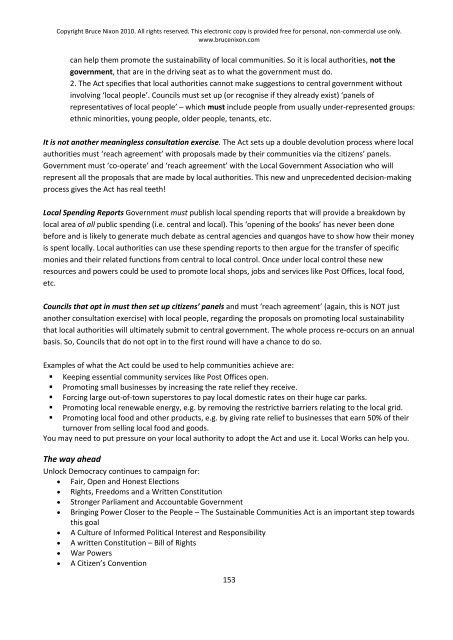A better world is possible - Global Commons Institute
A better world is possible - Global Commons Institute
A better world is possible - Global Commons Institute
You also want an ePaper? Increase the reach of your titles
YUMPU automatically turns print PDFs into web optimized ePapers that Google loves.
Copyright Bruce Nixon 2010. All rights reserved. Th<strong>is</strong> electronic copy <strong>is</strong> provided free for personal, non-commercial use only.<br />
www.brucenixon.com<br />
can help them promote the sustainability of local communities. So it <strong>is</strong> local authorities, not the<br />
government, that are in the driving seat as to what the government must do.<br />
2. The Act specifies that local authorities cannot make suggestions to central government without<br />
involving ‘local people’. Councils must set up (or recogn<strong>is</strong>e if they already ex<strong>is</strong>t) ‘panels of<br />
representatives of local people’ – which must include people from usually under-represented groups:<br />
ethnic minorities, young people, older people, tenants, etc.<br />
It <strong>is</strong> not another meaningless consultation exerc<strong>is</strong>e. The Act sets up a double devolution process where local<br />
authorities must ‘reach agreement’ with proposals made by their communities via the citizens’ panels.<br />
Government must ‘co-operate’ and ‘reach agreement’ with the Local Government Association who will<br />
represent all the proposals that are made by local authorities. Th<strong>is</strong> new and unprecedented dec<strong>is</strong>ion-making<br />
process gives the Act has real teeth!<br />
Local Spending Reports Government must publ<strong>is</strong>h local spending reports that will provide a breakdown by<br />
local area of all public spending (i.e. central and local). Th<strong>is</strong> ‘opening of the books’ has never been done<br />
before and <strong>is</strong> likely to generate much debate as central agencies and quangos have to show how their money<br />
<strong>is</strong> spent locally. Local authorities can use these spending reports to then argue for the transfer of specific<br />
monies and their related functions from central to local control. Once under local control these new<br />
resources and powers could be used to promote local shops, jobs and services like Post Offices, local food,<br />
etc.<br />
Councils that opt in must then set up citizens’ panels and must ‘reach agreement’ (again, th<strong>is</strong> <strong>is</strong> NOT just<br />
another consultation exerc<strong>is</strong>e) with local people, regarding the proposals on promoting local sustainability<br />
that local authorities will ultimately submit to central government. The whole process re-occurs on an annual<br />
bas<strong>is</strong>. So, Councils that do not opt in to the first round will have a chance to do so.<br />
Examples of what the Act could be used to help communities achieve are:<br />
• Keeping essential community services like Post Offices open.<br />
• Promoting small businesses by increasing the rate relief they receive.<br />
• Forcing large out-of-town superstores to pay local domestic rates on their huge car parks.<br />
• Promoting local renewable energy, e.g. by removing the restrictive barriers relating to the local grid.<br />
• Promoting local food and other products, e.g. by giving rate relief to businesses that earn 50% of their<br />
turnover from selling local food and goods.<br />
You may need to put pressure on your local authority to adopt the Act and use it. Local Works can help you.<br />
The way ahead<br />
Unlock Democracy continues to campaign for:<br />
Fair, Open and Honest Elections<br />
Rights, Freedoms and a Written Constitution<br />
Stronger Parliament and Accountable Government<br />
Bringing Power Closer to the People – The Sustainable Communities Act <strong>is</strong> an important step towards<br />
th<strong>is</strong> goal<br />
A Culture of Informed Political Interest and Responsibility<br />
A written Constitution – Bill of Rights<br />
War Powers<br />
A Citizen’s Convention<br />
153
















